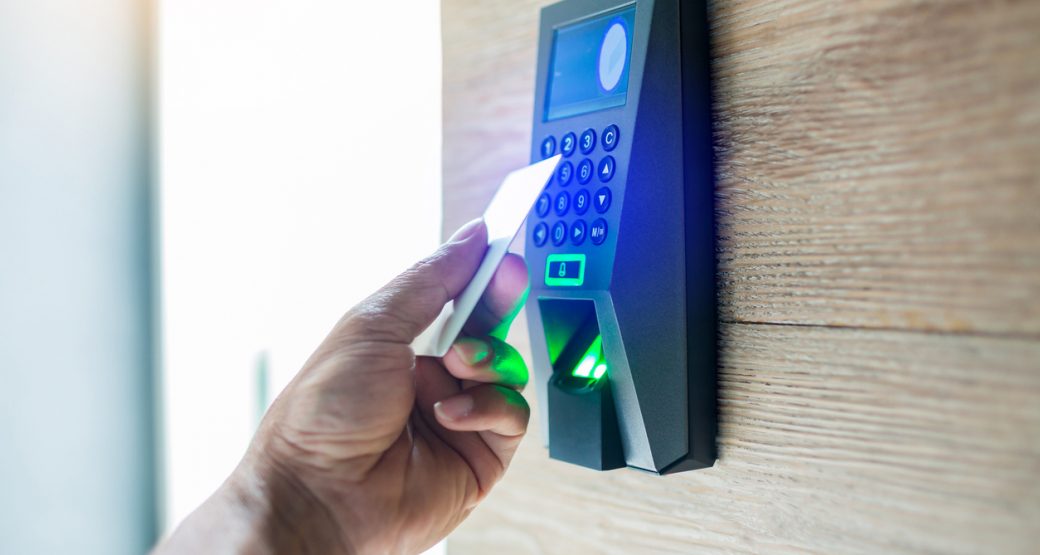Access control manages the way in which staff, vendors, customers, or visitors gain entry to various areas of your campus, office, or business. Different industries and organizations face distinct challenges when it comes to building access control systems that effectively protect their assets, whether it be securing information, employees, or valuable tools. A crucial step to effective asset protection is access control — and managing key areas in and around your facility with effective commercial access control systems.
The best commercial access control systems are tailored to the level of protection your assets require. You have the power to implement a highly restrictive system based on access control permissions and functionality. If needed, you can tag visitors on the individual level, manage permissions based on job roles, or allow more freedom with area-based restrictions. The right system will also function well for your organization’s size and industry needs. Organizations such as hospitals might prefer hands free access control systems, while smaller organizations may prefer more traditional card, or fob-based access control systems.
Learn how to maximize protection by comparing the features and functions of different commercial access control systems. Have any questions? Reach out to our security professionals directly.
Minimize Risk with Tailored Access Control Permissions
It’s no secret that strict standards require rigorous protection. A hospital maintaining HIPAA security standards, for example, faces different security risks than a government office that needs to stay NIST compliant, or even a bank, construction site, or international company. This is one of the main reasons it is so important to build tailored commercial access control systems. Discover how to control access with permissions — and protect sensitive data from threats like theft and misuse.
Role-Based Access Control (RBAC)
Role-based access control systems (RBAC) make it extremely convenient to manage user permissions and are one of the most widely used. With this access control system, access is limited based on job profiles. Permissions are granted to roles and then the roles are assigned to approved users.
With role-based access control systems, users are only permitted access to essential buildings, or spaces they need to perform their duties. If a specific area does not fall under their scope of work, access to that area is prohibited. This is a huge benefit for large companies who are looking to protect sensitive information.
Discretionary Access Control (DAC)
With a Discretionary Access Control System (DAC), the administrator determines who receives access to decided locations. It is a popular model for organizations looking for an easy-to-maintain system that is simple to manage. With this system, individuals are granted complete ownership over different areas. Although it remains a great option for small businesses, DAC is often not recommended for medical, financial, and military organizations with sensitive data due to the lower-level restrictions.
Mandatory Access Control (MAC)
Mandatory access control (MAC), on the other hand, is highly restrictive. In this system, the administrator assigns a tag to each user on the individual level based on organization security policies. Medical, financial, and military organizations, and others that put a premium on confidentiality, find many great benefits with this access control system. Any action taken by the permitted users is examined against the organization’s access control policies to check if the action is permitted.
Comparing Access Control Systems Based On Functionality
Standalone Network Access Control Systems
Also known as “traditional” access control systems, standalone access control systems are typically implemented by smaller organizations. This system is managed by a central access control panel connected to different cameras, electronic door locks, and readers. It remains the simplest way to control access around a building without needing to secure every door. If you are looking for cost savings and energy efficiency, a simple standalone access control system might be a great fit.
IP Networked Access Control Systems
IP networked access control systems are ideal for real-time auditing, tracking, and user management. Within this control system, main access control components are directly linked to a network via an ethernet or wireless connection. This access control system has several applications in corporate sectors — from biometric access to IP-based access door closing.
Zero-Touch Access Control Systems
Zero-touch access control systems provide additional convenience with contactless access control. With zero-touch access control systems, physical contact with door handles and buttons is completely eliminated. This feature was particularly advantageous throughout the COVID-19 pandemic and continues to remain important as users prefer contactless alternatives. Instead, users utilize hand-wave technology, face recognition, and their smartphones to enter commercial offices.
Stay Ahead of Security Risks with Effective Commercial Access Control Systems
As your business grows, appropriate access control becomes a necessity. Fully managing access control allows you to monitor which users are entering which areas, trigger alarms in cases of unauthorized access, and enable access based on day and time. Additionally, you can remotely manage access control and integrate your access control system with other key parts of your commercial security system, such as biometric access control and security cameras.
We understand it’s challenging to find a system that is the right balance between security and manageability. If you are still in between commercial access control systems, you can rely on our security professionals at Viking Security to find the right solution. Rather than use your own resources to manage access control, you can count on a team to build the system that addresses your security risks.
Based in Orlando, Florida, Viking Security brings 20 years of experience to every unique access control challenge. Protect your organization today with Viking Security by contacting our team.

